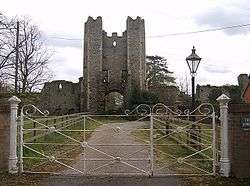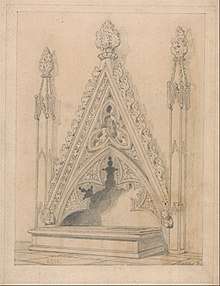Mettingham College
Mettingham College in Suffolk, England, within the curtilage of Mettingham Castle, was founded originally (24 July 1350) as a chantry college for 8 secular canons under a master at Raveningham in Norfolk.[1] The founder was Sir John de Norwich (died 1362),[2] (eldest son of Sir Walter de Norwich, Chief Baron of the Exchequer (died 1329)), whose sister Margaret married Robert de Ufford, the future 1st Earl of Suffolk, in 1324. The canons were to celebrate in the parish church of St Andrew, Raveningham, for the welfare of Sir John and his wife, the Blessed Virgin, St Andrew the Apostle, and All Saints. The College itself was dedicated to St Mary.


When writing his will in 1373, another Sir John, grandson of the founder, was planning to move the college to Norton Subcourse, and left £450 for the building of a new church there. However this plan foundered. His cousin Katherine de Brews became his heir, and as her trustees Sir Roger de Boys, John Playz and others in 1382 paid a very large sum to licence the removal of the college to Mettingham Castle. This also was frustrated owing to objections raised by the nuns of Bungay Priory, but the number of canons was increased to thirteen.
In 1387 therefore an interim move was made to Norton Subcourse, but with the concession that the college should have all the original endowments at Raveningham as well as those of Mettingham when the move was eventually made there. It remained at Norton for seven years and finally arrived at Mettingham Castle in 1394, where the college remained until its surrender to the Crown in 1542.[3]
A Register survived in the Stowe Library.[4][5] The College records have a place in the history of drama in England.[6][7] The College Library forms the basis of an important study.[8] The British Library holds numerous charters relating to Mettingham College.[9]
The Russian Orthodox College
While in no way a re-creation of the original medieval chantry college, on 1 September 2012 the College of Our Lady of Mettingham was formally inaugurated under the auspices of the Russian Orthodox Church Outside Russia in the grounds of The White House on the other side of the village of Mettingham. The College OLM is a unique institution which seeks to become an Orthodox pastoral, pilgrimage and education centre.
Notes
- 'College at Norton Soupecors, or Raveningham College, in Norfolk', in W. Dugdale, Monasticon Anglicanum, New Edition, Vol. 6 Part 3 (James Bohn, London 1846), p. 1459 (Google).
- J. Tait, 'Norwich, John de, Baron Norwich', Dictionary of National Biography (1885-1900), Vol. 41.
- 'Colleges: Mettingham', in W. Page (ed.), A History of the County of Suffolk, Vol. 2 (1975), pp. 144-145 (British History Online, accessed 26 May 2008).
- C. O'Conor, Bibliotheca MS. Stowensis. A Descriptive Catalogue of the Manuscripts in the Stowe Library (J. Seeley, Buckingham 1819), II, pp. 149-50 (Google).
- C.R. Manning, 'Extracts from the Ancient Accounts of Mettingham College, Suffolk', Archaeological Journal VI (1849), pp. 62-68 (archaeology data service pdf).
- R. Beadle, 'Dramatic Records of Mettingham College, Suffolk, 1403-1527', Theatre Notebook 33 no. 3 (1979), pp. 125-44.
- P.M. Clogan (ed.), Medievalia et Humanistica : Studies in Medieval and Renaissance Culture (in honor of S. Harrison Thomson), New series no. 1 (Case Western Reserve University, Cleveland 1970) ISBN 0-8295-0188-6
- J. Ridgard, 'Mettingham, Suffolk: the building of a religious college with particular reference to the acquisition and production of books for its library', Proceedings of the Suffolk Institute of Archaeology and History XLII Part 1 (2009), pp. 21-31 (Suffolk Institute pdf).
- See The National Archives (UK) Discovery Catalogue, Records for Mettingham College (Discovery).